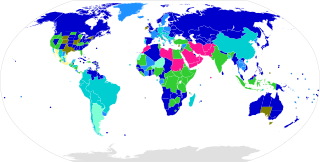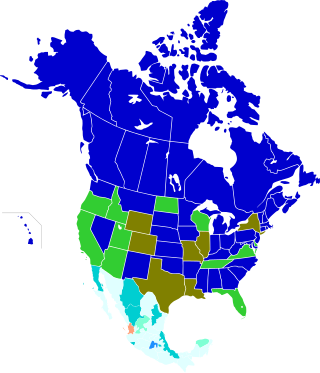
The age of consent is the age at which a person is considered to be legally competent to consent to sexual acts. Consequently, an adult who engages in sexual activity with a person younger than the age of consent is unable to legally claim that the sexual activity was consensual, and such sexual activity may be considered child sexual abuse or statutory rape. The person below the minimum age is considered the victim, and their sex partner the offender, although some jurisdictions provide exceptions through "Romeo and Juliet laws" if one or both participants are underage, and are close in age.
Sex and the law deals with the regulation by law of human sexual activity. Sex laws vary from one place or jurisdiction to another, and have varied over time. Unlawful sexual acts are called sex crimes.

The Sexual Offences Act 2003 is an Act of the Parliament of the United Kingdom.

Canadian lesbian, gay, bisexual, and transgender (LGBT) rights are some of the most extensive in the world. Same-sex sexual activity, in private between consenting adults, was decriminalized in Canada on June 27, 1969, when the Criminal Law Amendment Act, 1968–69 was brought into force upon royal assent. In a landmark decision in 1995, Egan v Canada, the Supreme Court of Canada held that sexual orientation is constitutionally protected under the equality clause of the Canadian Charter of Rights and Freedoms. In 2005, Canada was the fourth country in the world, and the first in the Americas, to legalize same-sex marriage nationwide. In 2022, Canada was the third country in the world, and the first in North America, to fully ban conversion therapy nationwide for both minors and adults.
The legal age of consent for sexual activity varies by jurisdiction across Asia. The specific activity engaged in or the gender of participants can also be relevant factors. Below is a discussion of the various laws dealing with this subject. The highlighted age refers to an age at or above which an individual can engage in unfettered sexual relations with another who is also at or above that age. Other variables, such as homosexual relations or close in age exceptions, may exist, and are noted when relevant.
The ages of consent for sexual activity vary from age 15 to 18 across Australia, New Zealand and other parts of Oceania. The specific activity and the gender of its participants is also addressed by the law. The minimum age is the age at or above which an individual can engage in unfettered sexual relations with another person of minimum age. Close in age exceptions may exist and are noted where applicable. In Vanuatu the homosexual age of consent is set higher at 18, while the heterosexual age of consent is 15. Same sex sexual activity is illegal at any age for males in Papua New Guinea, Kiribati, Samoa, Niue, Tonga and Tuvalu; it is outlawed for both men and women in the Solomon Islands. In all other places the age of consent is independent of sexual orientation or gender.
The ages of consent vary by jurisdiction across Europe. The ages of consent – hereby meaning the age from which one is deemed able to consent to having sex with anyone else of consenting age or above – are between 14 and 18. The vast majority of countries set their ages in the range of 14 to 16; only four countries, Cyprus (17), the Republic of Ireland (17), Turkey (18), and the Vatican City (18), set an age of consent higher than 16.

In North America, the legal age of consent relating to sexual activity varies by jurisdiction.

The age of consent in Africa for sexual activity varies by jurisdiction across the continent, codified in laws which may also stipulate the specific activities that are permitted or the gender of participants for different ages. Other variables may exist, such as close-in-age exemptions.
Age of consent reform is an effort to change age of consent laws. Proposed reforms typically include raising, lowering, or abolishing the age of consent, applying close-in-age exemptions, changing penalties, or changing how cases are examined in court. A related issue is whether or not to enforce ages of consent on homosexual relationships that are different from those enforced on heterosexual relationships. Organized efforts have ranged from academic discussions to political petitions.
Christopher Paul Neil, also known as Mr. Swirl, Swirl Face, or Vico, is a Canadian child molester. He was the subject of a highly publicized Interpol investigation of the sexual abuse of at least 12 young boys in Vietnam, Cambodia, and Thailand, primarily owing to the Internet release of pornographic images depicting the abuse. He was arrested by Thai police in October 2007.
Laws regarding incest vary considerably between jurisdictions, and depend on the type of sexual activity and the nature of the family relationship of the parties involved, as well as the age and sex of the parties. Besides legal prohibitions, at least some forms of incest are also socially taboo or frowned upon in most cultures around the world.
In common law jurisdictions, statutory rape is nonforcible sexual activity in which one of the individuals is below the age of consent. Although it usually refers to adults engaging in sexual contact with minors under the age of consent, it is a generic term, and very few jurisdictions use the actual term statutory rape in the language of statutes. In statutory rape, overt force or threat is usually not present. Statutory rape laws presume coercion because a minor or mentally disabled adult is legally incapable of giving consent to the act.

A sodomy law is a law that defines certain sexual acts as crimes. The precise sexual acts meant by the term sodomy are rarely spelled out in the law but are typically understood by courts to include any sexual act deemed to be "unnatural" or "immoral". Sodomy typically includes anal sex, oral sex, manual sex, and bestiality. In practice, sodomy laws have rarely been enforced against heterosexual couples, and have mostly been used to target homosexual couples.

In the United States, each state and territory sets the age of consent either by statute or the common law applies, and there are several federal statutes related to protecting minors from sexual predators. Depending on the jurisdiction, the legal age of consent is between 16 and 18. In some places, civil and criminal laws within the same state conflict with each other.
Sexting is sending, receiving, or forwarding sexually explicit messages, photographs, or videos, primarily between mobile phones. It may also include the use of a computer or any digital device. The term was first popularized early in the 21st century and is a portmanteau of sex and texting, where the latter is meant in the wide sense of sending a text possibly with images. Sexting is not an isolated phenomenon but one of many different types of sexual interaction in digital contexts that is related to sexual arousal.
Child pornography is a type of erotic material that depicts persons under the age of 18. The precise characteristics of what constitutes child pornography varies by criminal jurisdiction.

Geldenhuys v National Director of Public Prosecutions and Others is a decision of the Constitutional Court of South Africa which struck down as unconstitutional a law which set the age of consent at 19 for homosexual sex but only 16 for heterosexual sex.

The Sexual Offences Act, 1957 is an act of the Parliament of South Africa which, in its current form, prohibits prostitution, brothel-keeping and procuring, and other activities related to prostitution. Before the law relating to sex offences was consolidated and revised by the Criminal Law Amendment Act, 2007, it also prohibited various other sex offences, including sex with children under the age of consent and sex with the mentally incompetent. As the Immorality Act it was infamous for prohibiting sex between a white person and a person of another race, until that prohibition was removed by a 1985 amendment.
The age of consent is the age at which a person is considered to be legally competent to consent to sexual acts and is thus the minimum age of a person with whom another person is legally permitted to engage in sexual activity. The distinguishing aspect of the age of consent laws is that the person below the minimum age is regarded as the victim, and their sex partner is regarded as the offender, unless both are underage.








